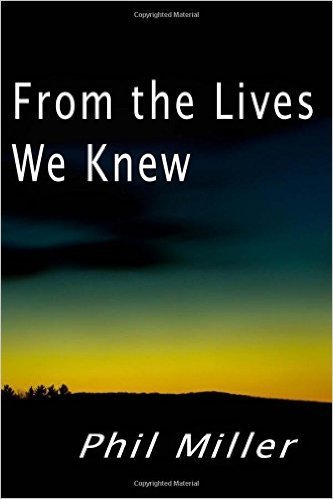Book Review: From the Lives We Knew

Full Disclosure: Phil Miller was a mentor of mine. He even preached at my ordination service back in 1998. I look on anything he’s written with a level of respect I might not give other books, but here’s my best attempt to give Phil’s book a review.
I often say, “There’s a story there somewhere.” I see a quirky character walking down the road, or the guy stocking the shelves at the store says he used to work in medical research, and I think or say, “There’s a story there.” I say that with the assumption that a particular journey brought that person to that particular place, and telling the tale of that journey would probably give a story most would be interested to hear. We see crowds of refugees on the news, groups of people fleeing one place and hoping for safety in another, and I know for each person in those masses of thousands a story could be told. If that story was told to us we’d probably hear something about a home place and how eventually safety in that home was threatened, and the person or family was threatened enough that they chose to leave everything that was familiar with the hope of finding safety in another place.
In From the Lives We Knew, Phil Miller narrates the stories of refugees. The places are different and each situation is unique, but in each story Phil tells of someone who is uprooted by circumstances bigger than the person(s) and required to journey to a new place. Phil offers a brief explanation, before each section, on the place and historical circumstances so the reader has some background to each story. In these stories we learn about those who are separated from family by borders that become impassible, those with skills who struggle to use them for employment after finding asylum, and those who leave their country but yet go back when given the opportunity. All the stories intersect with an American couple who work with refugee resettlement, and we learn of this American couple’s experiences, too, as they develop relationships with these refugees. All of the stories are fictional, but they’re based around real historical circumstances. In each story we hear a story of what a refugee’s journey might be like.
What I appreciated about From the Lives We Knew was that it humanized the headlines. We see news about those arriving in Europe seeking refuge, and we know that areas are unsafe, but we often don’t hear the story of individuals and families. The stories in From the Lives We Knew are fictional, but they’re representative of those dealing with these realities today. The book offers not a broad blurry picture of national struggles; instead, it offers the story of a particular person, family, or place, allowing us to see how an individual would experience these struggles. I see Phil’s book, too, through the lens of the Rule of St. Benedict, and I know that Benedict instructs guests at a monastery to be welcomed as if they were welcoming Christ. For Benedict showing hospitality to a stranger allows us to see Christ’s presence among us in the presence of these guests. I know we are in fearful times where politicians brag of closing borders and building walls. Benedict instructs, instead, an open door where we meet Jesus if the stranger there is welcomed. I’m so glad for Phil’s book which allows us to hear these strangers’ stories and teaches, hopefully, to welcome them as friends.
If you’re curious about From the Lives We Knew and are interested in purchasing it, you can find more information here.
"In drawing up its regulations, we hope to set down nothing harsh, nothing burdensome." - Rule of St. Benedict